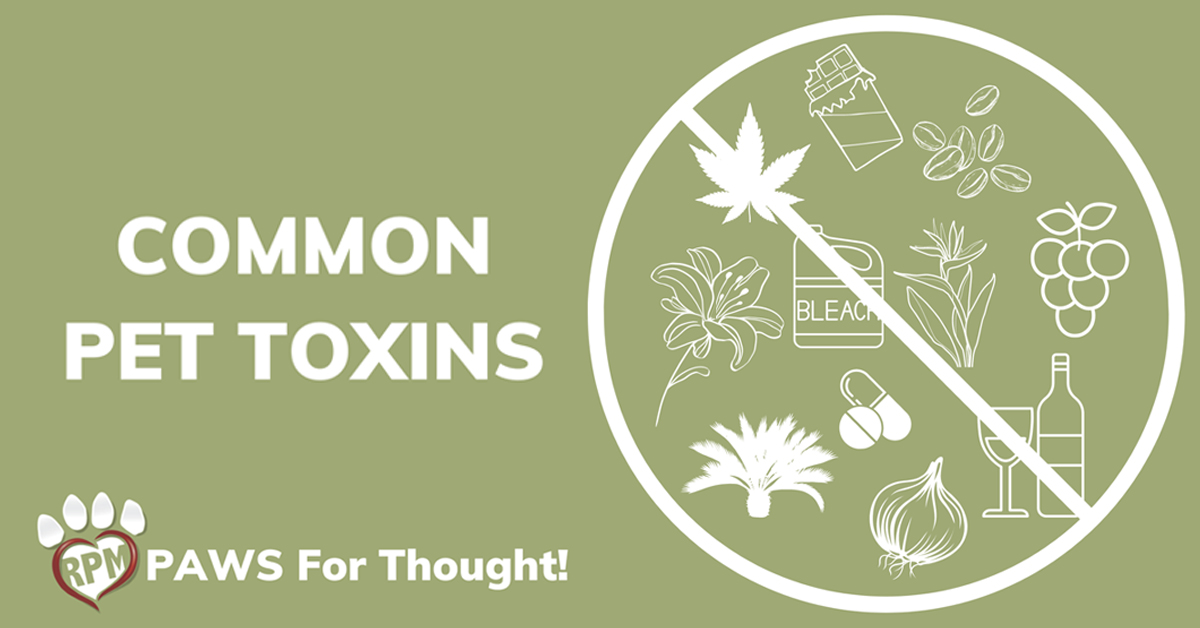Common Pet Toxins You May Not Know About

I think at one point we have all heard to never give our pets certain foods, like chocolate or grapes. But there are quite a few other common toxins that should be avoided to keep your pet safe and healthy! Certain plants, common household items, and foods that we eat on a regular basis can be extremely harmful to our furbabies. Your pet’s curious nature makes them want to taste everything. So always pay close attention to what you leave laying around!
If you believe your pet has ingested any toxic substance, call your veterinarian immediately!
Plants
- Sago Palm – The ENTIRE plant is toxic (seeds, fronds, etc.). May cause liver damage
- Marijuana (THC) – Animals’ bodies break down THC differently than humans do and can cause serious harm if ingested.
- Bird of Paradise – Although this indoor plant is beautiful, it is toxic if ingested by our furry friends.
- Azalea – These flowering plants can cause major gastrointestinal issues if ingested.
- Lilies – The ENTIRE plant is highly toxic to cats and can cause kidney failure.
Watch for:
- Vomiting
- Diarrhea
- Seizures
- Increased thirst
- Drowsiness
Non-Food Items
- Dryer sheets – If ingested, even used dryer sheets can cause GI blockage and/or irritation to the stomach lining.
- Bleach/household cleaners – Don’t worry, it’s fine to clean your house and your pet’s crate/other belongings with these items. Just keep a close eye on them when the product is out and being used.
- Pool chemicals – Be sure to keep these chemicals out of your pets reach! (e.g. a locked storage shed or placed on a high shelf).
- Ibuprofen and acetaminophen – Although these medicines are helpful to humans, they are toxic to our furry friends. Animals metabolize these chemicals differently than we do and can cause serious harm if ingested.
Watch for:
- Vomiting
- Diarrhea
- Lack of Appetite
Food
- Alcohol – Can cause organ failure and death if ingested.
- Chocolate – Contains a type of methylxanthine which is toxic to animals. Unsweetened baker’s chocolate and dark chocolate have the highest concentration of methylxanthines, while white chocolate has very low concentrations (should still NOT be given to pets).
- Caffeine – Also contain highly toxic methylxanthines
- Garlic/onion – Large amounts ingested can cause anemia in pets
- Grapes/raisins – What makes grapes toxic is pretty much unknown, but what we do know is that ingesting them can cause sudden kidney failure.
- Xylitol – This is a sweetener found in many foods, such as sugar-free gums and desserts, and even some peanut butters. Make sure to always read the ingredient list before giving peanut butter to your pet!
Watch for:
- Vomiting
- Diarrhea
- Excessive thirst
- Decreased coordination
*Please note that these are just a few of the most common toxins.

Want to join the movement?
Why I Foster…
“We started fostering after our personal pets all passed as we hope to travel extensively. Fostering fills the void when we are home and our goal is to fill them with love before their journey. It’s always hard to let go but the posts from other fosters make you know that you are not alone. Plus, there’s always another to help. RPM has made such a difference for Houston area animals. I always feel supported and heard.”

- Monday 9am - 6pm
- Tuesday 9am - 6pm
- Wednesday 9am - 6pm
- Thursday 9am - 6pm
- Friday 9am - 6pm
- Saturday 9am - 6pm
- Sunday 10am - 4pm
Rescued Pets Movement
The Jack C. Alexander Building
2317 W 34th Street
Houston, TX 77018
